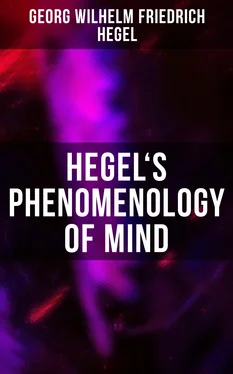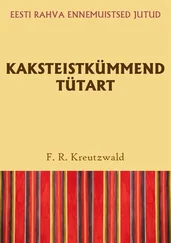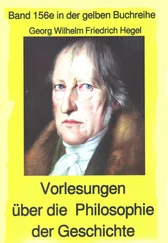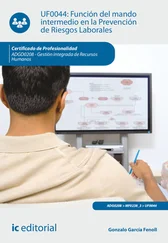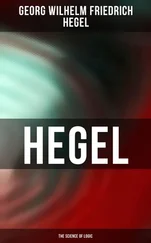Georg Wilhelm Friedrich Hegel - Hegel's Phenomenology of Mind
Здесь есть возможность читать онлайн «Georg Wilhelm Friedrich Hegel - Hegel's Phenomenology of Mind» — ознакомительный отрывок электронной книги совершенно бесплатно, а после прочтения отрывка купить полную версию. В некоторых случаях можно слушать аудио, скачать через торрент в формате fb2 и присутствует краткое содержание. Жанр: unrecognised, на английском языке. Описание произведения, (предисловие) а так же отзывы посетителей доступны на портале библиотеки ЛибКат.
- Название:Hegel's Phenomenology of Mind
- Автор:
- Жанр:
- Год:неизвестен
- ISBN:нет данных
- Рейтинг книги:4 / 5. Голосов: 1
-
Избранное:Добавить в избранное
- Отзывы:
-
Ваша оценка:
- 80
- 1
- 2
- 3
- 4
- 5
Hegel's Phenomenology of Mind: краткое содержание, описание и аннотация
Предлагаем к чтению аннотацию, описание, краткое содержание или предисловие (зависит от того, что написал сам автор книги «Hegel's Phenomenology of Mind»). Если вы не нашли необходимую информацию о книге — напишите в комментариях, мы постараемся отыскать её.
Hegel's Phenomenology of Mind — читать онлайн ознакомительный отрывок
Ниже представлен текст книги, разбитый по страницам. Система сохранения места последней прочитанной страницы, позволяет с удобством читать онлайн бесплатно книгу «Hegel's Phenomenology of Mind», без необходимости каждый раз заново искать на чём Вы остановились. Поставьте закладку, и сможете в любой момент перейти на страницу, на которой закончили чтение.
Интервал:
Закладка:
Analysis of an idea, as it used to be carried out, did in fact consist in nothing else than doing away with its character of familiarity. To break up an idea into its ultimate elements means returning upon its moments, which at least do not have the form of the given idea when found, but are the immediate property of the self. Doubtless this analysis only arrives at thoughts which are themselves familiar elements, fixed inert determinations. But what is thus separated, and in a sense is unreal, is itself an essential moment; for just because the concrete fact is self-divided, and turns into unreality, it is something self-moving, self-active. The action of separating the elements is the exercise of the force of Understanding, the most astonishing and greatest of all powers, or rather the absolute power. The circle, which is self-enclosed and at rest, and, qua substance, holds its own moments, is an immediate relation, the immediate, continuous relation of elements with their unity, and hence arouses no sense of wonderment. But that an accident as such, when out loose from its containing circumference — that what is bound and held by something else and actual only by being connected with it — should obtain an existence all its own, gain freedom and independence on its own account-this is the portentous power of the negative; it is the energy of thought, of pure ego. Death, as we may call that unreality, is the most terrible thing, and to keep and hold fast what is dead demands the greatest force of all. Beauty, powerless and helpless, hates understanding, because the latter exacts from it what it cannot perform. But the life of mind is not one that shuns death, and keeps clear of destruction; it endures death and in death maintains its being. It only wins to its truth when it finds itself utterly torn asunder. It is this mighty power, not by being a positive which turns away from the negative, as when we say of anything it is nothing or it is false, and, being then done with it, pass off to something else: on the contrary, mind is this power only by looking the negative in the face, and dwelling with it. This dwelling beside it is the magic power that converts the negative into being. That power is just what we spoke of above as subject, which by giving determinateness a place in its substance, cancels abstract immediacy, i.e. immediacy which merely is , and, by so doing, becomes the true substance, becomes being or immediacy that does not have mediation outside it, but is this mediation itself.
This process of making what is objectively presented a possession of pure self-consciousness, of raising it to the level of universality in general, is merely one aspect of mental development; spiritual evolution is not yet completed. The manner of study in ancient times is distinct from that of the modem world, in that the former consisted in the cultivation and perfecting of the natural mind. Testing life carefully at all points, philosophizing about everything it came across, the former created an experience permeated through and through by universals. In modem times, however, an individual finds the abstract form ready made. In straining to grasp it and make it his own, he rather strives to bring forward the inner meaning alone, without any process of mediation; the production of the universal is abridged, instead of the universal arising out of the manifold detail of concrete existence. Hence nowadays the task before us consists not so much in getting the individual clear of the stage of sensuous immediacy, and making him a substance that thinks and is grasped in terms of thought, but rather the very opposite: it consists in actualizing the universal, and giving it spiritual vitality, by the process of breaking down and superseding fixed and determinate thoughts. But it is much more difficult to make fixed and definite thoughts fuse with one another and form a continuous whole than to bring sensuous existence into this state. The reason lies in what was said before. Thought determinations get their substance and the element of their existence from the ego, the power of the negative, or pure reality; while determinations of sense find this in impotent abstract immediacy, in mere being as such. Thoughts become fluent and interfuse, when thinking pure and simple, this inner immediacy, knows itself as a moment, when pure certainty of self abstracts from itself. It does not “abstract” in the sense of getting away from itself and setting itself on one side, but of surrendering the fixed quality of its self-affirmation, and giving up both the fixity of the purely concrete-which is the ego as contrasted with the variety of its content-and the fixity of all those distinctions [the various thought-functions, principles, etc.] which are present in the element of pure thought and share that absoluteness of the ego. In virtue of this process pure thoughts become notions, concepts, and are then what they are in truth, self-moving functions, circles, are what their substance consists in, are spiritual entities.
This movement of the spiritual entities constitutes the nature of scientific procedure in general. Looked at as the concatenation of their content, this movement is the necessitated development and expansion of that content into an organic systematic whole. By this movement, too, the road, which leads to the notion of knowledge, becomes itself likewise a necessary and complete evolving process ( Werden ). This preparatory stage thus ceases to consist of casual philosophical reflections, referring to objects here and there, to processes and thoughts of the undeveloped mind as chance may direct; and it does not try to establish the truth by miscellaneous ratiocinations, inferences, and consequences drawn from circumscribed thoughts. The road to science, by the very movement of the notion itself, will compass the entire objective world of conscious life in its rational necessity.
Further, a systematic exposition like this constitutes the first part of science, because the positive existence of mind, qua primary and ultimate, is nothing but the immediate aspect of mind, the beginning; the beginning, but not yet its return to itself. The characteristic feature distinguishing this part of science [Phenomenology] from the others is the element of positive immediate existence. The mention of this distinction leads us to discuss certain established ideas that usually come to notice in this connexion.
The mind’s immediate existence, conscious life, has two aspects — cognition and objectivity which is opposed to or negative of the subjective function of knowing. Since it is in the medium of consciousness that mind is developed and brings out its various moments, this opposition between the factors of conscious life is found at each stage in the evolution of mind, and all the various moments appear as modes or forms ( Gestalten ) of consciousness. The scientific statement of the course of this development is a science of the experience through which consciousness passes; the substance and its process are considered as the object of consciousness. Consciousness knows and comprehends nothing but what falls within its experience; for what is found in experience is merely spiritual substance, and, moreover, object of its self. Mind, however, becomes object, for it consists in the process of becoming an other to itself, i.e. an object for its own self, and in transcending this otherness. And experience is called this very process by which the element that is immediate, unexperienced, i.e. abstract-whether it be in the form of sense or of a bare thought — externalizes itself, and then comes back to itself from this state of estrangement, and by so doing is at length set forth in its concrete nature and real truth, and becomes too a possession of consciousness.
The dissimilarity which obtains in consciousness between the ego and the substance constituting its object, is their inner distinction, the factor of negativity in general. We may regard it as the defect of both opposites, but it is their very soul, their moving spirit. It was on this account that certain thinkers long ago took the void to be the principle of movement, when they conceived the moving principle to be the negative element, though they had not as yet thought of it as self. While this negative factor appears in the first instance as a dissimilarity, as an inequality, between ego and object, it is just as much the inequality of the substance with itself. What seems to take place outside it, to be an activity directed against it, is its own doing, its own activity; and substance shows that it is in reality subject. When it has brought out this completely, mind has made its existence adequate to and one with its essential nature. Mind is object to itself just as it is , and the abstract element of immediacy, of the separation between knowing and the truth, is overcome. Being is entirely mediated; it is a substantial content, that is likewise directly in the possession of the ego, has the character of self, is notion. With the attainment of this the Phenomenology of Mind concludes. What mind prepares for itself in the course of its phenomenology is the element of true knowledge. In this element the moments of mind are now set out in the form of thought pure and simple, which knows its object to be itself. They no longer involve the opposition between being and knowing; they remain within the undivided simplicity of the knowing function; they are the truth in the form of truth, and their diversity is merely diversity of the content of truth. The process by which they are developed into an organically connected whole is Logic or Speculative Philosophy.
Читать дальшеИнтервал:
Закладка:
Похожие книги на «Hegel's Phenomenology of Mind»
Представляем Вашему вниманию похожие книги на «Hegel's Phenomenology of Mind» списком для выбора. Мы отобрали схожую по названию и смыслу литературу в надежде предоставить читателям больше вариантов отыскать новые, интересные, ещё непрочитанные произведения.
Обсуждение, отзывы о книге «Hegel's Phenomenology of Mind» и просто собственные мнения читателей. Оставьте ваши комментарии, напишите, что Вы думаете о произведении, его смысле или главных героях. Укажите что конкретно понравилось, а что нет, и почему Вы так считаете.
